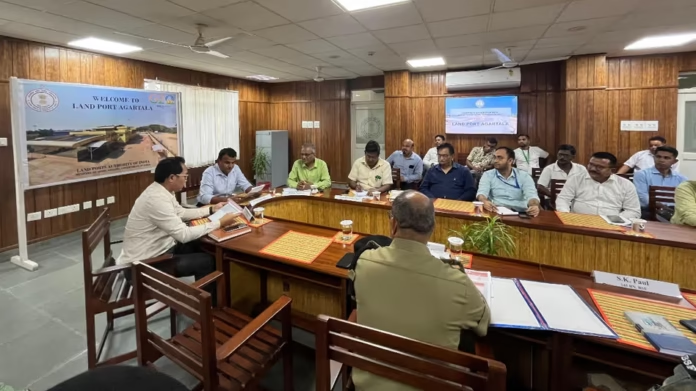In a move to enforce Tripura import restrictions, the Industries and Commerce Department of Tripura held a crucial meeting with local importers. The focus was on implementing the Centre’s latest directive that imposes restrictions on the import of select goods from neighboring countries, including Bangladesh.
The meeting, held in Agartala, aimed to ensure cooperation between officials and traders while highlighting the importance of national economic interests and legal compliance.
Tripura Import Restrictions Take Center Stage
The Centre’s directive, issued earlier this month, restricts the import of specific products considered to impact India’s domestic manufacturing negatively. Tripura, a key border state, acts as a trade corridor with Bangladesh and therefore plays a critical role in enforcement.
Officials emphasized that the new import restrictions were not meant to discourage trade, but rather to promote domestic industries, ensure product quality, and maintain national security standards.
The government reiterated its commitment to supporting importers through legal guidance and process clarifications. Importers were asked to update their documentation and logistics systems to align with the directive.
For more on recent trade and commerce developments in the state, visit our Tripura Economy Updates.
Challenges Raised by Importers
During the meeting, several importers voiced concerns about the sudden changes. Many noted the lack of clarity regarding which goods were included in the restrictions. Others highlighted logistical disruptions at land ports such as Akhaura Integrated Check Post (ICP).
Despite these concerns, most traders supported the move once assured of the government’s intent to work collaboratively. Officials encouraged importers to submit queries in writing and attend follow-up sessions for specific issues.
The Industries and Commerce Department announced it would circulate an FAQ document to address common doubts and ensure smooth compliance.
Read our coverage on India-Bangladesh trade challenges to understand broader regional dynamics.
Strengthening Border Trade Monitoring
One of the key steps discussed was tightening inspection and clearance processes at Tripura’s major trading points. This includes coordination with customs, security agencies, and land port authorities.
The state government plans to introduce digitized cargo tracking, better verification systems, and regular importer audits. These steps aim to minimize loopholes and reinforce transparency across cross-border operations.
An internal control cell within the Industries and Commerce Department will oversee implementation and provide real-time updates to the Ministry of Commerce in Delhi.
Policy Compliance With Economic Vision
Officials stated that these restrictions align with the Centre’s broader push for ‘Atmanirbhar Bharat’ (Self-Reliant India). By discouraging unnecessary imports and strengthening the position of domestic producers, the government hopes to balance trade deficits and boost national output.
Tripura officials noted that while the region has long benefited from cross-border trade, excessive reliance on certain imports hurts local manufacturers and artisans. With these new policies, the state hopes to strike a better balance between trade facilitation and domestic growth.
For insights into the government’s self-reliance mission, read our analysis on Atmanirbhar Bharat and Trade Policy.
Looking Ahead: Education, Compliance, and Cooperation
The Tripura government plans to hold awareness drives, training sessions, and one-on-one consultations with importers over the next few weeks.
The aim is to ensure seamless adaptation to the new rules, without harming legitimate businesses. Special focus will be placed on helping small and medium-sized importers understand the long-term benefits of the restrictions.
A Balanced Approach to Enforcement
With this proactive outreach, Tripura becomes one of the first Northeast states to actively involve importers in implementing national trade directives.
This collaborative approach can serve as a model for other border states, where trade plays a pivotal role in both revenue generation and regional diplomacy.
Stay updated on Tripura import restrictions and state trade policies by visiting our Northeast Trade Portal.
For updates from the Ministry of Commerce, visit commerce.gov.in.
Tripura is showing that strong policy enforcement doesn’t have to come at the cost of partnership. The road ahead is about balance—between regulation and trade, compliance and growth.

